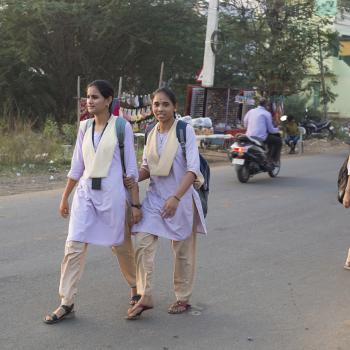
The Skills for Young Lives Podcast is now out and available to listen to on the Oxford University Podcast platform
Young Lives Director Cath Porter unpacks the latest research on how girls and boys develop skills throughout childhood and adolescence; how poverty, gender and global crises shape their experiences; and in what ways policies can empower equitable futures.
The podcast features a series of three absorbing conversations with academic, policy and programme experts. In the first, out today, RTI's Matthew Jukes is in conversation with Young Lives Director, Cath Porter.
This podcast has been created as part of our research into gender, skills and education, funded by Echidna Giving. Please note that the views of our guest speakers in this podcast series are their own.
Episode 1: Unpacking gender and social and emotional skills in the global south (out now)
Children’s skills are a broad field and consistent terminology is elusive. In this episode, Matthew Jukes focuses on socio-emotional skills, in particular how they are valued in the global south. He discusses Young Lives latest research on socio-emotional skills, which shows how gender differences emerge in adolescence, what this means for girls’ and boys’ life chances, and how policies and programmes can support future opportunities.
Speakers
- Cath Porter, Director, Young Lives, University of Oxford
- Matthew Jukes, Fellow in International Education at RTI International
- Julia Tilford, Communications Manager, Young Lives
Episode 2: How to keep girls in high school in India (out Wednesday 31st January)
Why do more girls in India drop out of higher education, despite having similar skills to boys? Sharing her personal journey from Montessori teacher to education research and policy expert, and highlighting findings from Young Lives’ latest research, Renu Singh teases out how patriarchy continues to prevent girls completing their education compared to boys. Highly experienced in the policy field, Renu offers practical ways to influence policy makers and deliver meaningful change.
Speakers
- Renu Singh, Country Director, Young Lives India
- Cath Porter, Director of Young Lives, University of Oxford
Episode 3: Supporting children’s skills development – what works (out February 7th)
Early life circumstances are important in later outcomes. Young Lives' latest longitudinal analysis shows that poverty and exposure to early climate shocks impacts skills in later childhood – but these effects are not inevitable, and support from social protection and school feeding programmes can make a real difference. Kath Ford and Sarah Lane Smith discuss what this means for policy, arguing for an holistic, intersectoral approach to provide an enabling environment to support equitable skills development and education outcomes.
Sarah Lane Smith is Education Research Adviser in the Research & Evidence Directorate of the UK Foreign Commonwealth and Development Office. The views expressed here are the authors’ own and are not a representation of official UK government policy.
Speakers


The Skills for Young Lives Podcast is now out and available to listen to on the Oxford University Podcast platform
Young Lives Director Cath Porter unpacks the latest research on how girls and boys develop skills throughout childhood and adolescence; how poverty, gender and global crises shape their experiences; and in what ways policies can empower equitable futures.
The podcast features a series of three absorbing conversations with academic, policy and programme experts. In the first, out today, RTI's Matthew Jukes is in conversation with Young Lives Director, Cath Porter.
This podcast has been created as part of our research into gender, skills and education, funded by Echidna Giving. Please note that the views of our guest speakers in this podcast series are their own.
Episode 1: Unpacking gender and social and emotional skills in the global south (out now)
Children’s skills are a broad field and consistent terminology is elusive. In this episode, Matthew Jukes focuses on socio-emotional skills, in particular how they are valued in the global south. He discusses Young Lives latest research on socio-emotional skills, which shows how gender differences emerge in adolescence, what this means for girls’ and boys’ life chances, and how policies and programmes can support future opportunities.
Speakers
- Cath Porter, Director, Young Lives, University of Oxford
- Matthew Jukes, Fellow in International Education at RTI International
- Julia Tilford, Communications Manager, Young Lives
Episode 2: How to keep girls in high school in India (out Wednesday 31st January)
Why do more girls in India drop out of higher education, despite having similar skills to boys? Sharing her personal journey from Montessori teacher to education research and policy expert, and highlighting findings from Young Lives’ latest research, Renu Singh teases out how patriarchy continues to prevent girls completing their education compared to boys. Highly experienced in the policy field, Renu offers practical ways to influence policy makers and deliver meaningful change.
Speakers
- Renu Singh, Country Director, Young Lives India
- Cath Porter, Director of Young Lives, University of Oxford
Episode 3: Supporting children’s skills development – what works (out February 7th)
Early life circumstances are important in later outcomes. Young Lives' latest longitudinal analysis shows that poverty and exposure to early climate shocks impacts skills in later childhood – but these effects are not inevitable, and support from social protection and school feeding programmes can make a real difference. Kath Ford and Sarah Lane Smith discuss what this means for policy, arguing for an holistic, intersectoral approach to provide an enabling environment to support equitable skills development and education outcomes.
Sarah Lane Smith is Education Research Adviser in the Research & Evidence Directorate of the UK Foreign Commonwealth and Development Office. The views expressed here are the authors’ own and are not a representation of official UK government policy.
Speakers


